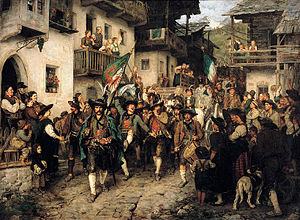Second Potato War
Not to be confused with First Potato War.
| Second Potato War | |||||||
|---|---|---|---|---|---|---|---|
 Rebels in Willing, Vollardie | |||||||
| |||||||
| Belligerents | |||||||
| Peasant Army | Grand Ducal Army | ||||||
| Commanders and leaders | |||||||
|
Frank Journeay Michel Berthomeu † Reikhard von Bläse † |
Auguste III de Somua Hubert de Bois | ||||||
| Strength | |||||||
| 15,500 - 22,000 | |||||||
| Casualties and losses | |||||||
| >35,000 | <2,000 | ||||||
The Second Potato War (Burgoignesc: Deuxieme Guerre Tartifle, East Gothic: Zweites Kartoffelnkrieg), Great Potato War or Great Potato Rebellion was a widespread popular revolt that took place in Yonderre between 1787–1788. The cause of the war were the Potato Laws that had been introduced in 1765, making the importation of potatos from abroad prohibitively expensive. Due to the harsh winter of 1886/1887, the 1887 harvest was poor and famine seemed likely. As small-scale illegal smuggling from the Holy Levantine Empire proved insufficient in suppyling the peasants, they revolted against the Potato Laws and the Grand Duke.
Uprisings began in Amarre, Somua and Vollardie concurrently in the early Summer of 1787. Following a series of meeting engagements, the war ended with the rebel armies destroyed. However, despite their defeat on the battlefield, the rebels achieved their primary aim of abolishing the Potato Laws, repealed in the Summer of 1788 by Grand Duke Auguste III de Somua. The war has thus been described variously as both a rebel defeat but also a phyrric rebel victory.
Potato Laws
The Potato Laws were tariffs and other trade restrictions on imported potatos enforced in Yonderre between 1765 and 1788. The laws concerned the import of all vegetables considered potato. They were designed to keep grain prices high to favour domestic producers and represented Yonderian mercantilism. The Potato Laws blocked the import of cheap potatos, initially by simply forbidding importation below a set price, and later by imposing steep import duties, making it too expensive to import potatos from abroad, even when food supplies were short.
The Potato Laws enhanced the profits and political power associated with land ownership. The laws raised food prices and the costs of living for the Yonderian public, and hampered the growth of other Yonderian economic sectors, such as manufacturing, by reducing the disposable income of the general Yonderian public and rural Gothic population in particular.
Impending famine
The winter 1786/1787 was extremely harsh for much of Yonderre. The summer of 1786 had been unusually hot and dry and water sources often dried up. In the fall, signs of a harsh winter ahead began to appear. Birds began flying south earlier than usual and some cattle grew thicker and shaggier coats than normal. The first snows fell earlier than usual, in November, and were reported as some of the worst in memory. Extreme cold killed humans and animals. Some people got lost near their houses and froze to death very near their front doors.
The unusual weather had made for a poor harvest in 1786 and presented poor conditions for the upcoming 1787 harvest.
Course of the war
Uprisings began in Amarre, Somua and Vollardie concurrently in the early Summer of 1787. The rebels seized several major cities and looting was widespread. The Grand Ducal Army responded cautiously at first, barricading themselves in their barracks in the afflicted cities. When rebels in Willing laid siege to the barracks and attempted to storm them, the soldiers responded with gunfire, causing the first casualties of the war. The rebellion was somewhat successful initially, however, lacking proper arms and training it was crushed over the Winter and only scant skirmishes took place in the following Spring.
Result
The war ended with the rebel armies destroyed. However, despite their defeat on the battlefield, the rebels achieved their primary aim of abolishing the Potato Laws, repealed in the Summer of 1788 by Grand Duke Auguste III de Somua. The war has thus been described variously as both a rebel defeat but also a phyrric rebel victory.